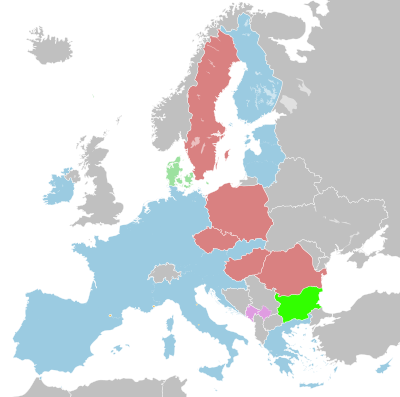Eurozone
| Policy of |
|
|---|---|
| Type | Monetary union |
| Currency | Euro |
| Established | 1 January 1999 |
| Members | |
| Governance | |
| Political control | Eurogroup |
| Group president | Jeroen Dijsselbloem |
| Issuing authority | European Central Bank |
| ECB president | Mario Draghi |
| Statistics | |
| Population (2016) | 340 million |
| GDP (2015) | €10.5 trillion |
| Interest rate | 0.00% |
| Inflation | 0.0% |
| Unemployment | 9.8% |
| Trade balance | €0.14 trillion trade deficit |
The eurozone (![]() pronunciation ), officially called the euro area, is a monetary union of 19 of the 28 European Union (EU) member states which have adopted the euro (€) as their common currency and sole legal tender. The monetary authority of the eurozone is the Eurosystem. The other nine members of the European Union continue to use their own national currencies, although most of them are obliged to adopt the euro in future.
pronunciation ), officially called the euro area, is a monetary union of 19 of the 28 European Union (EU) member states which have adopted the euro (€) as their common currency and sole legal tender. The monetary authority of the eurozone is the Eurosystem. The other nine members of the European Union continue to use their own national currencies, although most of them are obliged to adopt the euro in future.
The eurozone consists of Austria, Belgium, Cyprus, Estonia, Finland, France, Germany, Greece, Ireland, Italy, Latvia, Lithuania, Luxembourg, Malta, the Netherlands, Portugal, Slovakia, Slovenia, and Spain. Other EU states (except for Denmark and the United Kingdom) are obliged to join once they meet the criteria to do so. No state has left, and there are no provisions to do so or to be expelled.Andorra, Monaco, San Marino, and Vatican City have formal agreements with the EU to use the euro as their official currency and issue their own coins.Kosovo and Montenegro have adopted the euro unilaterally, but these countries do not officially form part of the eurozone and do not have representation in the European Central Bank (ECB) or in the Eurogroup.
...
Wikipedia

